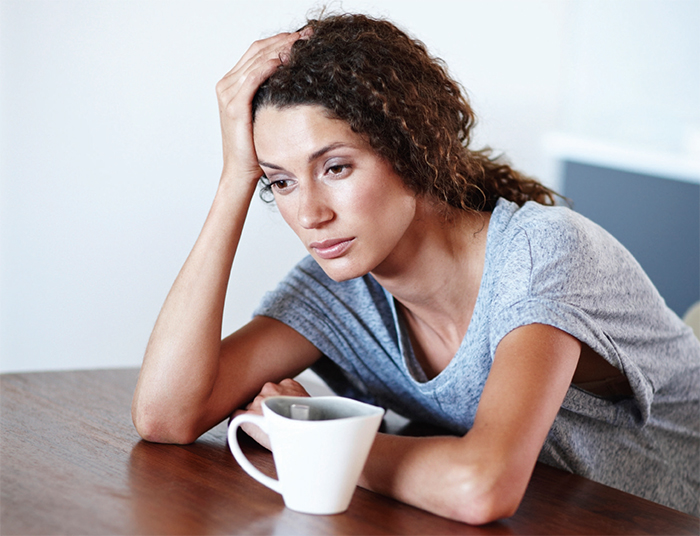Energy zappers
In In-depth
Follow this topic
Bookmark
Record learning outcomes
One in five people usually feel tired, while one in 10 suffer from prolonged fatigue. But what are the reasons behind our dwindling energy levels and what can be done to revive them?

Tiredness is a common feeling in this busy, modern world. Spending days on over-drive, trying to cram as much as possible into 24 hours and barely stopping for breath is bound to lead to bouts of fatigue. Low energy is often associated with a short temper, a lack of focus and, in the long-term, an increased risk of injury. The good news is that tiredness alone is rarely a sign of a medical condition. €Most of the time, fatigue is linked with mood and the accumulation of lots of little stresses in life,€ says Dr Rupal Shah, a London-based GP. €There's more chance of a medical reason for tiredness if there are other symptoms present as well.€
So let's take a look at 10 possible reasons for tiredness and low energy and find out what customers can do about them€¦
1. Lack of sleep
It's not unusual for people to wake in the morning wishing they could go back to sleep, but for some people, insomnia can become a debilitating cycle that is difficult to break.
There are two main reasons for waking up tired €“ one is that a person hasn't had refreshing or good quality sleep and the other is that they are woken in the middle of a sleep cycle. Most of us wake to alarms or children rather than waking up naturally and this can leave us feeling groggy and tired.
Humans sleep in roughly 90-minute cycles, so it's a good idea when choosing what time to go to sleep, to work backwards in 90-minute chunks. A lack of sleep can cause headaches, irritability and anxiety, making it harder to cope with everyday situations. Sufferers then worry about not sleeping and the condition worsens. However, there are many lifestyle habits and choices that people can change to improve their quality of sleep:
- Many people mistakenly turn to alcohol as a sedative, yet its effect wears off as it is metabolised, causing people to wake in the night and have trouble drifting off again. In the same vein, caffeine is then often used as a stimulant during the day, but this then disrupts the process of falling asleep. Advise customers to cut back on alcohol and coffee from around 5pm every day
- Studies have shown that smokers take longer to fall asleep and wake frequently in the night, so be ready to discuss the benefits of quitting and highlight the help that's available in the pharmacy
- Research also suggests that the blue light emitted from TVs and computers inhibits production of the sleep-inducing hormone melatonin. Recommend at least an hour of screen-free time before bed.
2. Stressful times
Stress, worry and anxiety are feelings that everyone experiences from time to time, but they become a concern when people feel unable to cope. Prolonged periods of worry can affect our ability to sleep, leading to tiredness, low energy and low mood.
Common causes of stress include demanding workloads, fraught relationships and financial concerns, but even positive changes like getting married or moving house can have an impact. Frances Taylor, trustee of the International Stress Management Association UK describes triggers as: €Situations that threaten the status quo and where the individual feels powerless€.
When a person feels anxious, their mind and body speeds up, preparing them to respond to the threat that the mind perceives. The body releases certain hormones as it initiates its 'flight or fight' mechanism, making people feel alert and on-edge. This can cause immediate physical effects such as a racing heart or churning stomach. If this anxiety continues over a long period of time then these effects can lead to irritability, a nagging sense of fear, and trouble sleeping. High blood pressure, palpitations, headaches, dizziness and constant colds or infections are also common.
Stress itself isn't an illness and can often be managed through lifestyle choices. €Even the most resilient person has a limit,€ says Frances. €Self awareness is so important as well as daily strategies to reduce the impact of stress.€
Noting stressful situations can help identify obvious triggers, while regularly exercising and socialising can have a calming effect, so situations can be dealt with rationally. During times of stress, it can be tempting to give up hobbies or exercise, however these are effective ways to unwind and aid sleep.
3. Everyday pain
Around 25 per cent of people with persistent pain develop anxiety, while a further 25 per cent become depressed. Both of these can cause difficulty sleeping and problems with energy levels. And, as if that wasn't enough, the part of the brain that receives pain signals also controls sleep, making it feel impossible for sufferers to get a good night's sleep.
But there are lots of ways in which customers can help themselves. Dr Beverly Collett, consultant in pain medicine at the University of Lancaster, says: €Self-management is the bedrock of pain management. Persistent pain doesn't always respond to OTC products, so pharmacies can assist patients with looking at other strategies. For instance, we know that being dehydrated is linked to migraines.€
Exercise can help, despite it probably being low on the 'to-do' list of people who are in pain, but even gentle walking can block pain signals to the brain. Encourage customers to become more active gradually, and reassure them that the benefits often outweigh any initial increase in pain. Light yoga and stretching can offer temporary relief and act as an effective stress-reliever too.
4. Poor nutrition
A healthy diet is essential to maintain energy levels. Starchy foods such as potatoes and wholegrain rice contain energy in the form of slow-releasing carbohydrates, and should make up a third of our diet. Including omega-3 fats from walnuts or oily fish in the diet encourages the body to store carbohydrates as glycogen, the main source of stored fuel, rather than fat. Recommend snacking on nuts and eating oily fish such as mackerel or salmon once a week. Refined sugar gives quick-fix energy, but quickly causes crashes and cravings. Fruit sources are fine, but advise cutting down on sweet treats and fizzy drinks.
A lack of iron can make people feel tired and faint, yet the National Diet and Nutrition survey revealed that 42 per cent of teenagers are lacking in this essential mineral. Dietary sources include red meat, poultry, eggs, dried fruit and green, leafy vegetables.
Advise eating every three to four hours to maintain constant blood sugar levels. It's also important to match our calorie intake against our activity levels. On average, men need 2,500 calories a day and women 2,000. However, many people overestimate their activity levels and overeat.
Most of the time, fatigue is linked with mood and the accumulation of lots of little stresses in life
5. Dehydration
Water is vital for the body to function properly. Even mild dehydration can cause blood to thicken, making the heart pump harder and causing fatigue. Fluid lost through sweat, urine and respiration needs to be replaced, with water being the healthiest choice for quenching thirst. The European Food Safety Authority recommends around eight glasses of water a day for women and around 10 for men, but it's best to advise drinking enough to produce clear urine every two to three hours.
6. Lack of exercise
How often we exercise, and the intensity of the exercise, also has a role in energy levels. Studies have shown that aerobic exercise helps people fall asleep faster, spend more hours in deep sleep and wake less in the night, while vigorous exercise can perk us up. Even everyday activity increases the number of mitochondria or 'power stations' in the body's cells, boosting energy levels.
If someone is new to exercise, recommend they take small, gradual steps to begin with. Gentle walking, swimming and gardening are a good start for inactive customers.
It is also important to link exercise with good nutrition and rest, to ensure the person gets the full energy-boosting benefits.
 Regular exercise can help to reduce stress levels, ease pain and aid sleep
Regular exercise can help to reduce stress levels, ease pain and aid sleep
7. Sleep apnoea
Obstructive sleep apnoea (OSA) is a condition where breathing is fleetingly interrupted during sleep €“ enough to waken the sleeper, albeit momentarily, until normal breathing is resumed. In sufferers, the muscles and soft tissues in the throat relax and collapse during sleep, blocking the airways. Yet sufferers usually have no memory of their sleep being disturbed by breathlessness, and are often unaware they have the condition.
Aside from tiredness, symptoms include having a sore throat, poor concentration and headaches.
Simple lifestyle measures can help people with diagnosed mild OSA, including limiting alcohol consumption, losing excess weight and cutting out smoking.
8. Underactive thyroid
The thyroid gland has an important job to do in the body because it produces a hormone called thyroxine, which manages the body's energy use. If the thyroid gland doesn't produce sufficient amounts of this hormone, it is deemed underactive. If a person has an underactive thyroid, symptoms can include tiredness, weight gain, dry skin, pins and needles and feelings of depression.
The condition is much more common in women than men €“ around 15 in every 1,000 women and just one in 1,000 men are affected, although it can be difficult to spot. It is diagnosed by a blood test which measures hormone levels, and can be treated with hormone replacement medication. If it is left untreated, it can increase the risk of heart problems, and fertility and mental health issues.
9. Chronic fatigue
Chronic fatigue syndrome (CFS), also known as ME (myalgic encephalomyelitis), is a serious illness lasting for at least six months for more than 50 per cent of the time.
The main symptom is an overwhelming tiredness that affects both the mind and the body. Other symptoms might include headaches and joint and muscle pain.
Otherwise healthy people can develop the condition following an infection, vaccination or trauma. However, there is sometimes no clear explanation and a diagnosis can often take time. Constant fatigue means it is often confused for lupus or MS, so anyone with unexplained tiredness should be referred to the pharmacist.
10. Diabetes
Diabetes is another condition that can impact the quality of a person's sleep. In the UK, 3.2 million people have diabetes, and a further 630,000 people are estimated to have undiagnosed type 2 diabetes.
Type 1 diabetes normally occurs in childhood and is unpreventable. However, type 2 is associated with being overweight, having a large waist (31.5 inches for women, 37 inches for men) and a family history of the disease. Diabetes occurs when glucose levels in the blood are too high, so it cannot all be converted into energy. Uncontrolled diabetes causes sleep disturbance as sufferers often need to urinate during the night. Glucose is also lost via the urine, further depriving the body of energy.
Diabetes can be controlled by medication, insulin and following a healthy diet. Customers complaining of fatigue, thirst and increased urination should talk to the pharmacist.
Sleep hygiene
Sleep can be hard to come by for a number of reasons, but people can follow these 'sleep hygiene' tips to help them get sufficient shuteye:
- Aim for eight hours a night
- Keep sleeping hours consistent
- Relax with a warm bath before bed
- Listen to soothing music
- Stretch to relieve muscle pain
- Write 'to do' lists to clear distractions from the mind
- Make bedrooms dark, clean and between 18-24°C
- Keep a sleep diary to uncover detrimental habits.
